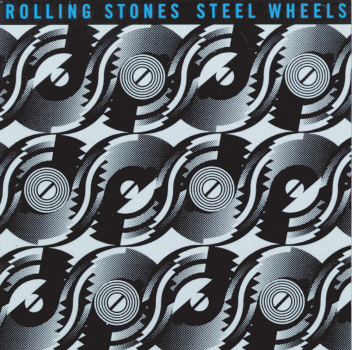
Steel Wheels (1989)

1.Sad Sad Sad
2.Mixed Emotions
3.Terrifying
4.Hold on to Your Hat
5.Hearts for Sale
6.Blinded by Love
7.Rock and a Hard Place
8.Can't Be Seen
9.Almost Hear You Sigh
10.Continental Drift
11.Break the Spell
12.Slipping Away
By the end of the 1980s, most had assumed the game was up. After a pair of lackluster albums, a very public feud between Jagger and Richards, and solo ventures that ranged from forgettable to embarrassing, The Rolling Stones seemed to be limping into rock’s retirement home. Then came the press conference. In 1989, the five Stones appeared, smiling and playful, flanking a boombox pumping out a few new tracks. It was an oddly perfect moment—unapologetically low-key, yet entirely electric. The Stones were back. And maybe, just maybe, they meant it this time.
Steel Wheels was the comeback. And what a comeback it was—if not entirely musical, then certainly in terms of presence. The album was accompanied by the most extravagant tour they’d ever attempted (and this is the Rolling Stones we’re talking about), and the band was suddenly everywhere again. MTV. Rolling Stone magazine. Stadiums. The world hadn’t seen such a high-profile resurrection since Elvis swapped his jumpsuit for a badge.
Truth be told, the album itself wasn’t a masterpiece. Had it dropped during their 1970s golden run, it would’ve been written off as one of their weaker efforts. But compared to Dirty Work and Undercover, this was a revelation. At the very least, it sounded like a band again.
It helps that the record opens on solid footing. Sad Sad Sad and Mixed Emotions are prime examples of late-era Stones that still manage to sound distinctly like, well, the Stones. No excessive production gloss. No confused genre-hopping. Just straight-ahead, guitar-driven rock with a bit of bite. From there, the band takes some calculated detours. Terrifying and Break the Spell flirt with new textures but do so successfully, while Continental Drift pulls off something altogether rare—a fusion of Middle Eastern instrumentation and the band’s signature style that somehow works.
Keith Richards, perhaps energized by the détente with Mick, steps up with two tracks instead of the usual one. Can’t Be Seen has become a minor live staple, and Slipping Away finds him at his most soulful. It's a quiet standout and one of the more affecting songs the band had released in years.
Of course, not everything sticks. Blinded by Love aims for country pastiche and ends up more parody than homage. Almost Hear You Sigh, despite its status as a single, feels overly polished and emotionally hollow. By the time that third single hit, you could almost feel the burnout setting in again.
Still, Steel Wheels was never really about reinvention. It was about reassertion. It reminded everyone—fans and skeptics alike—that The Rolling Stones could still write, record, and (most importantly) show up as a band. It would also turn out to be Bill Wyman’s final studio outing with the group, though few realized it at the time. This wasn’t a record built to change the world. But it didn’t need to. After the chaos of the previous decade, it was enough that the Stones were alive, together, and still rolling.
Go back to the main page
Go To Next Review